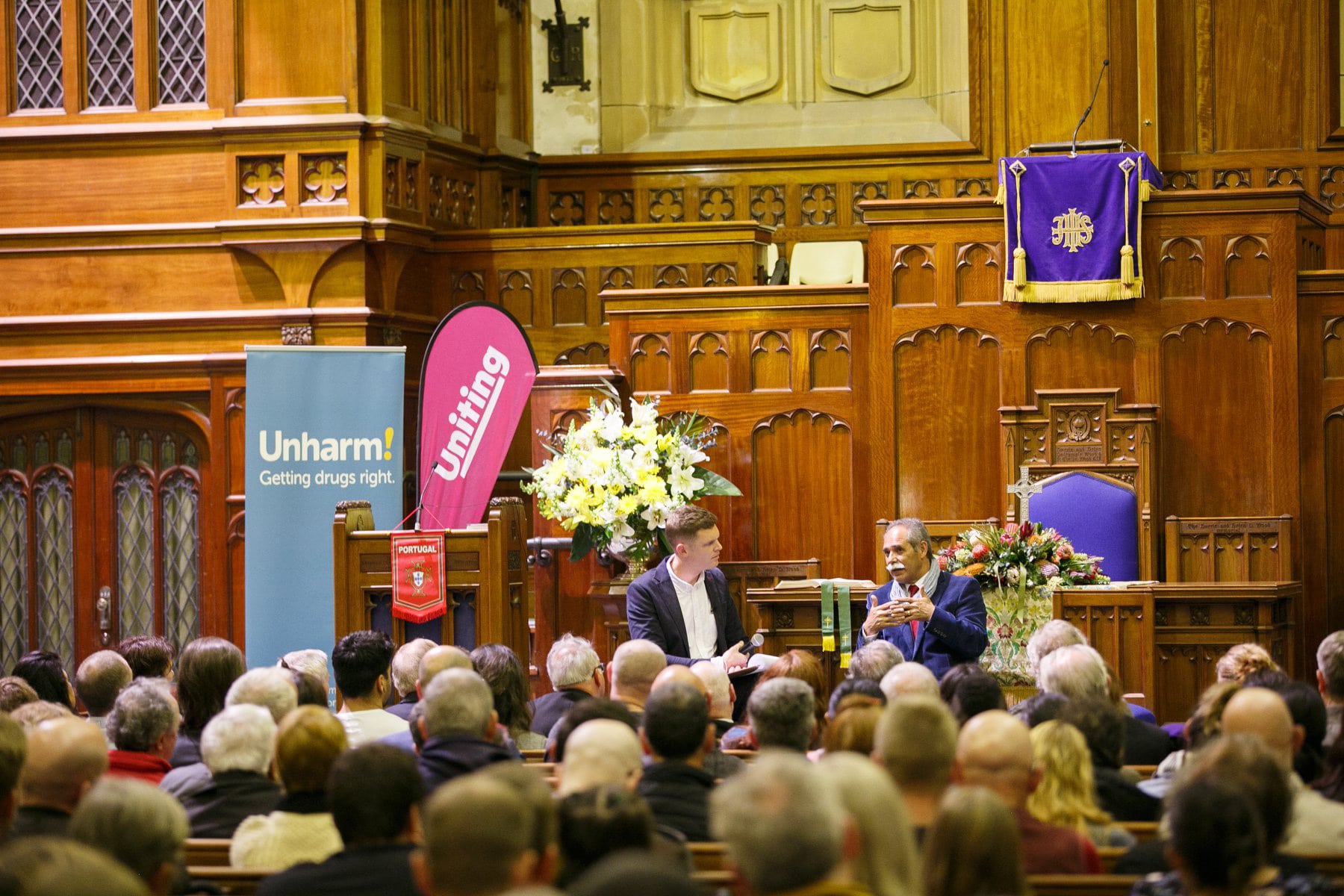
Gutierrez declared he was PM for all Portuguese citizens, including people who use drugs
Unharm and Uniting join forces for a talk with Portugal’s Mr Decriminalisation’
Daniel Reeders
15.7.18
It’s a Tuesday night and Sydney is completely sodden, and yet a steady stream of punters flows into and eventually fills St Stephen’s Uniting Church. After several years of collaboration behind the scenes, this is Uniting’s first time out in public with Unharm.
In the audience, jagged asymmetrical haircuts and high fades sit companionably among stately silvers and grays. Unharm CEO Will Tregoning opens with a joke: ‘What’s everybody on, tonight?’ There’s audible silence. ‘Trick question,’ he continues, ‘you’re all on Aboriginal land.’ So the evening begins by acknowledging not just the traditional owners but the way Aboriginal people are disproportionately targeted by anti-drug law enforcement.
We’re here tonight to hear Will interview Manuel Cardoso, Deputy Director-General of the agency responsible for drug policy in Portugal, which in 2001 was the first country in the world to decriminalise the personal use of drugs. Cardoso is a softly-spoken man, measured in his choice of words, yet for a bureaucrat he is surprisingly frank, talking about the politics of the reforms, the role of the Catholic church, and police officers’ distaste for paperwork. In Portugal, under the leadership of then-PM (and now UN Secretary-General) António Gutierrez, a bipartisan commission of experts was convened to review the country’s approach to illicit drugs.
Cardoso describes the political framing of the reform process. Gutierrez declared he was PM for all Portuguese citizens, including people who use drugs—rejecting the dehumanisation so often practiced against drug users. A survey at the time found one per cent of all citizens had problems related to use of drugs, and the reform process was framed in terms of asking how voters would want their own friends and relatives to be treated. Cardoso says the political framing was that local people should be able to use local perspectives to solve local problems.
The resulting framework positions drug users as people needing assistance and treatment. The reforms shifted possession of a personal quantity of drugs from a criminal offence to an administrative offence. Under this regime, a person found with a personal quantity of drugs — enough for up to ten days’ use, without any indication of selling to others — will be referred to a ‘Commission of Dissuasion’, which consists of a lawyer, a doctor and a social worker, and can refer the person to a drug treatment program. Portugal invested heavily in expanding access to treatment, at only a fraction of the cost of incarceration and drug law enforcement.
Following the interview there’s a panel discussion featuring Dr Marianne Jauncey, medical director of the Uniting-run Medically Supervised Injecting Centre (MSIC), and Prof Geoff Gallop, former WA premier and Director of the Graduate School of Government at the University of Sydney. The conversation quickly turns to whether and how ‘the Portuguese experiment’ might be achieved in Australia, since human rights values and political culture clearly made a substantial contribution to the reform process.
As the author John Birmingham argues, beneath the shiny glass-and-steel surfaces of Sydney you’ll find a political culture not too far-removed from its origins as a penal colony. Not six months ago, a Daily Telegraph headline announced ‘Refugees “welcome” to shoot up in Sydney’, the article declaring ’Drug users and refugees are over-represented in terrorist attacks. So why is Sydney’s government-supported drug injection room encouraging refugees to take drugs?’
Gallop shares his experience of the decriminalisation of cannabis use in WA, arguing we should emulate the bipartisan approach taken during the Australian response to the AIDS crisis, otherwise any reforms will be overturned following the next change of government. Marion McConnell, who lost her son to overdose and then co-founded Families and Friends for Drug law Reform, and long-term advocate Bill Crews take the microphone to share their frustration about the slow pace of change around drug law reform in Australia — arguing we don’t need more evidence, or more powerful stories, but effective political advocacy. Referring to the reform commission established in Portugal, Gallop notes a similar approach — the formation of a Citizens’ Assembly to consider contentious issues — led to momentous changes in Ireland, including the legalisation of abortion and gay marriage.
After the forum, we troop downstairs for refreshments, kindly provided by Uniting, and I take the chance to gauge reactions. A friend and colleague recalled travelling in Ireland during the debate over abortion, noting the messages that ‘worked’ were quite tame by activist standards — ‘what if a young woman in your family got herself into trouble?’ A colleague describes an influx of new members to the Unharm Facebook and the Queer Contingent, and we discuss the importance of opportunities like tonight’s forum for reaching the people who have few friends in common with existing Unharm members. Unharm vollies work the room with clipboards and sign up a sizeable number of people keen to volunteer.
As we part ways, Unharm board member Gideon Warhaft makes a similar point. He is excited about the size of the turnout for decriminalisation, and the fact it’s happening in a church and in partnership with Uniting. ‘I think tonight was momentous, I think it’s really the start of something.’
About:
Daniel Reeders is a PhD researcher at the ANU School of Regulation and Governance, studying the cultural dimensions of the social governance of health. He is partnering with Unharm on a study of community engagement
Sign up
Sign up for movement news and opportunities to get involved
We are building a movement to make drug use legal and safe in Australia so that everyone has a better chance to lead a healthy and happy life.